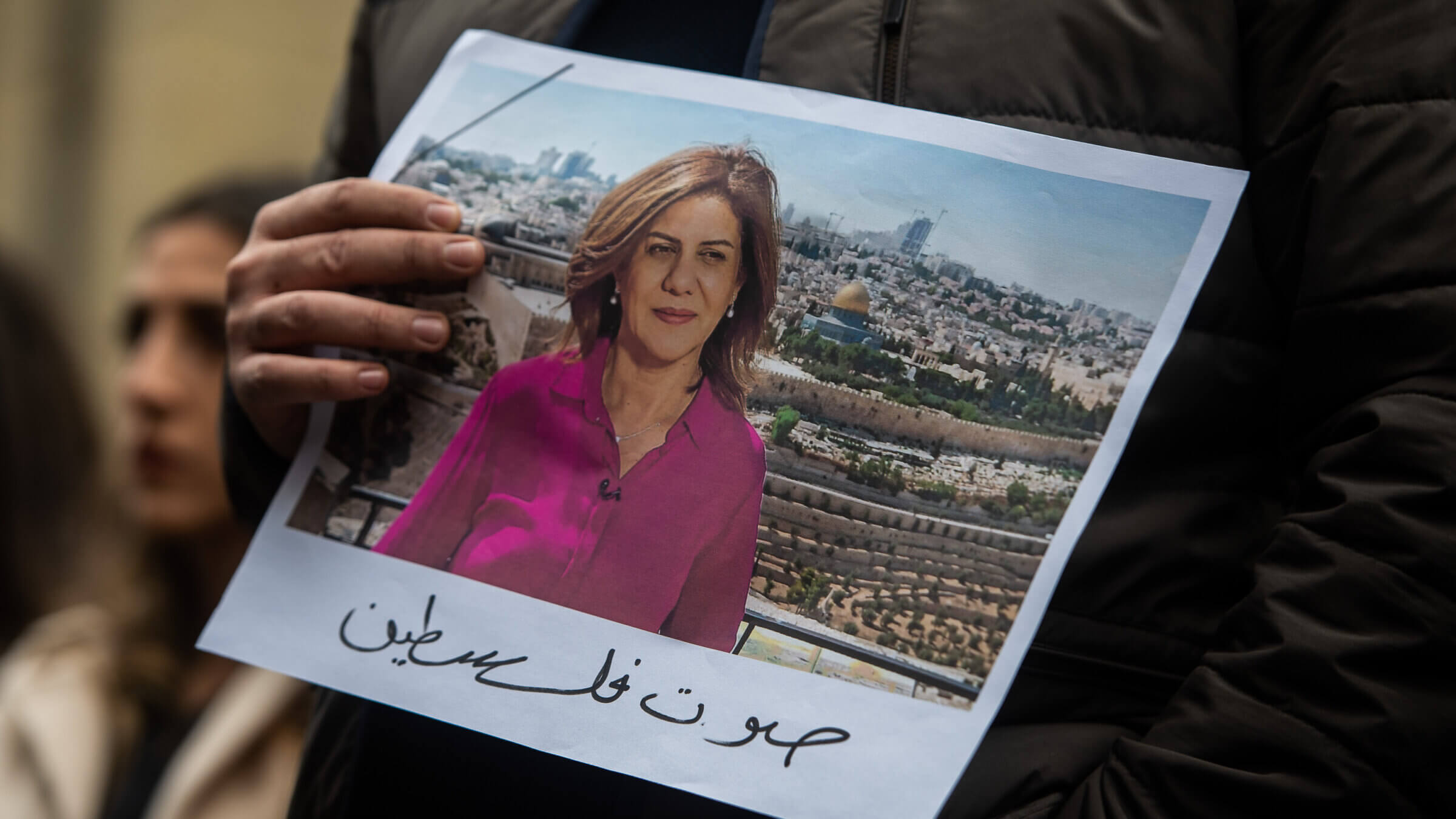What happened to Shireen Abu Akleh? American Jews must demand the truth
The veteran Palestinian-American journalist was shot and killed May 11. That is all anyone can agree on.

Tributes are paid to murdered Palestinian journalist Shireen Abu Akleh at a protest and vigil at BBC Broadcasting House on May 12, 2022 in London Photo by Guy Smallman/Getty Images
The American reaction to the killing of a veteran Al-Jazeera journalist in Jenin is following a sad, familiar pattern.
Shireen Abu Akleh, 51, was shot and killed May 11. That is all anyone can agree on.
Israel’s critics have already decided Israeli soldiers shot the much-loved Palestinian-American journalist while carrying out a May 11 raid in the West Bank city. Israel’s defenders have decided that Palestinian gunmen killed Abu Akleh while firing on Israelis.
I’m part of a third constituency: I’d like to know the truth. And America’s Jewish leaders and mainstream organizations need to make finding out the facts behind Abu Akleh’s death a priority as well.
An independent, international inquiry into Abu Akleh’s killing, launched immediately with the full cooperation of Israeli and Palestinian authorities, is the best way to help Palestinians, journalists — and Israel.
As of now, there is little indication that partisans on any side can handle the truth.
Within a day of the tragic death, Michigan Representative Rashida Tlaib made it clear her mind was made up:
“When will the world and those who stand by Apartheid Israel that continues to murder, torture and commit war crimes finally say: ‘Enough’?”
At the same time, the American Jewish Committee stood by the Israeli version of events:
“When the IDF entered Jenin’s refugee camp and the nearby town of Burqin to arrest suspects, Palestinian gunmen ambushed them, opening fire and using explosives. Abu Akleh’s death resulted from this confrontation. Until an investigation takes place, that is all we will know.”
This is an all-too-common pattern among America’s Israel defenders: whatever happens, issue statements that evince sorrow but adhere to the official Israeli position. And it’s mirrored in a standard pattern among Israel’s detractors: whatever happens, blame the Israelis.
Two decades after the September 2000 killing of 12 year-old Muhammad al-Durrah during a clash between Israeli soldiers and Palestinians, each side remains stuck to its narrative over who’s at fault.
An Israeli investigation determined that a 2014 Israeli missile strike that killed four Palestinian boys on a beach in Gaza was a “tragic accident.” Palestinians said it was yet more proof that the IDF deliberately targets civilians.
No matter the tragedy, we see the same responses.
So far, the Palestinian Authority has refused an Israeli offer for a joint investigation. Palestinian officials have also refused to release the results of a pathology exam which has called the results of its initial investigation inconclusive, and rejected requests from Israel to turn over the bullet that killed Abu Akleh. (The bullet’s origin and shape could help officials determine which side fired it, and from where.)
But the Israeli track record of investigating itself doesn’t inspire a great deal of confidence, either. Shortly after the shooting, Israeli officials released a video purporting to show the gunfire that killed Abu Akleh coming from the Palestinian side.
The human rights organization B’Tselem fact-checked the claims in the actual location and contended that the gunfire in the video, “cannot be the gunfire that killed Journalist Shireen Abu Akleh.”
B’Tselem noted that Israeli investigations into civilian killings rarely find the IDF at fault, and never hold military leaders and politicians accountable for policies that, the group says, inevitably lead to civilian deaths.
But getting to the truth about Abu Akleh’s death is especially urgent.
The reporter, a native of East Jerusalem who also held United States citizenship, was a frequent presence on Al-Jazeera television.
“She was the voice of Palestine to the rest of the Arab world and its diaspora,” Mezna Qato, a historian at the University of Cambridge, told Vox.
At least 55 journalists and media workers were killed in conflicts or targeted murders around the world in 2021. Israel itself carried out a bombing attack on Al-Jazeera offices in Gaza City in 2014 — the occupants had prior warning and no one was killed.
An investigation that exonerates Israel in Abu Akleh’s death could only help the country’s international standing, differentiating it from Putin’s Russia or Mexico, where journalists work with targets on their backs.
That’s why Israel’s American supporters should not settle for statements from the prime minister’s office or an Israeli-only investigation into the May 11 killing. It’s why Israel’s strongest supporters in the White House and Congress should help initiate a fair, international investigation. A country that prides itself on its press freedom and democracy has more to lose by hiding the facts than by holding the guilty accountable.
Rob Eshman is Senior Contributing Editor of the Forward. To contact the author, email [email protected].
















